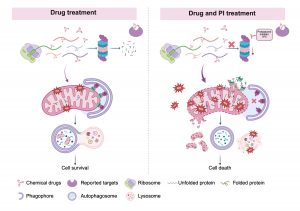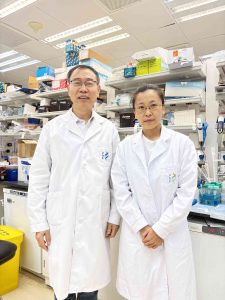A research team led by Chuxia Deng, chair professor in the Faculty of Health Sciences (FHS) at the University of Macau (UM), has made a significant breakthrough in understanding the mechanisms of cancer drug resistance. The study reveals that proteasomes play a key role in controlling ROS-BNIP3-mediated mitophagy triggered by cancer drugs, and this process impacts the survival and drug resistance of cancer cells. This finding offers new insights into how to overcome cancer drug resistance. The research has been published in the internationally renowned journal Drug Resistance Updates.
Multidrug resistance (MDR) is associated with increased proteasome activity, which facilitates the clearance of damaged proteins, and reduced mitochondrial activity, which contributes to quiescence. However, the mechanistic link between protein damage, mitochondrial dysfunction, and proteasome activity remains elusive. To explore the potential link between these factors in MDR, the research team utilised fluorescent drugs, inducible mitochondrial protein models, and mass spectrometry.
The key findings of the study are as follows: 1. Chemical drugs bind to newly synthesised mitochondrial proteins, and are imported into the mitochondria. 2. Damaged proteins that are imported into the mitochondria trigger a mitochondrion-lysosome-mediated chain reaction, including the integrity stress response (ISR) and the mitochondrial unfolded protein response (UPRmt), followed by increased lysosome biogenesis and ROS-BNIP3-mediated mitophagy. 3. The proteasome monitors proteostasis, suppresses mitochondrial protein import, and promotes mitophagy under both normal and drug-treated conditions. 4. The proteasome inhibitor bortezomib (BTZ) can trigger the excessive mitochondrial import of damaged proteins, causing mitochondrial membrane damage, profound mitochondrial ROS production and leakage, lysosome membrane permeabilisation, and impaired mitophagy. 5. Combining BTZ with other drugs can induce a new type of cell death by inhibiting mitochondrial autophagy, thereby overcoming tumour drug resistance.
Prof Deng and Xu Xiaoling, adjunct associate professor in FHS, are the corresponding authors of the study. Li Ling, a doctoral student in FHS, is the first author, and Feng Yangyang, a postdoctoral fellow in FHS, is the co-first author. FHS members who also contributed to the study include Research Assistant Professors Shao Fangyuan and Sun Heng; doctoral students Tang Dongyang, Lin Shiqi, Chu Xiangpeng, Qiao Yunfeng, and Li Hanghang; and post-doctoral fellows Zhou Jingbo and Lei Haipeng. The research project was funded by the National Natural Science Foundation of China (NSFC) (File No.: 82030094), the Science and Technology Development Fund of the Macao SAR (File Nos.: 0004/2021/AKP, 0007/2021/AKP, 0129/2024/RIA2, 0054/2023/RIA1, 0065/2021/A, 0193/2024/AGJ and 0009/2022/AKP), and UM (File Nos.: CPG2025-00035-FHS, MYRG2022-00175-FHS, MYRG-GRG2023-00029-FHS-UMDF, and MYRG-GRG2024-00073-FHS). The full version of the research article can be accessed at: https://www.sciencedirect.com/science/article/pii/S1368764625000974.
| Source: Faculty of Health Sciences | |
| Media Contact Information: | |
| Communications Office, University of Macau | |
| Albee Lei | Tel: (853) 8822 8004 |
| Bell Leong | Tel: (853) 8822 8009 |
| Email: | prs.media@um.edu.mo |



